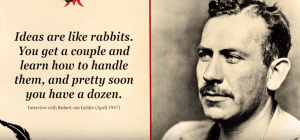 Waiting is a difficult game and not many of us are built to handle it well. “Waiting for what?” you might ask. It could be waiting for your next plot idea, next book concept, or waiting for a literary agent to get back to you after a full manuscript request. So, to ease the pain, here are a few suggestions:
Waiting is a difficult game and not many of us are built to handle it well. “Waiting for what?” you might ask. It could be waiting for your next plot idea, next book concept, or waiting for a literary agent to get back to you after a full manuscript request. So, to ease the pain, here are a few suggestions:
- Relax. Take time to review you plot outline. Go back over your character arcs too. Like a good meal, add some spice and “kick it up a notch” where you feel best to do so.
- Start another book. That is, look forward. Never look back too far and keep on being creative because that’s where the juices flow best. Begin to outline some ideas for your next novel. Will it be the same genre or a new venture – perhaps a YA or even a children’s book?
- Take stock of major events; events in your own life or current events. Read the news and sniff out another story. You might find an article that brings a great perspective. Has something unusual happened that might bring freshness to you story? Ah, the inspiration for a book surrounds us all. In 3 WISE MEN, I was ruminating and came up with a great new chapter to slot into a rather pedestrian section. It worked so well that I reprinted the book. Finally,
- Get out of your head and take a walk around your world. Listen to conversations, sit at a coffee shop and observe. Volunteer and learn.

 However, whatever circumstances I find myself in, I have my writing antennae ready to pick up a comment or gesture; a news item or statement, or any snippet that will be useful in my book. For example, my wife and I were on a train in the south of France. I looked over the isle and saw someone who fitted a character I was writing about. Their hair, their shoes, and their facial expression quickly joined the description I needed.
However, whatever circumstances I find myself in, I have my writing antennae ready to pick up a comment or gesture; a news item or statement, or any snippet that will be useful in my book. For example, my wife and I were on a train in the south of France. I looked over the isle and saw someone who fitted a character I was writing about. Their hair, their shoes, and their facial expression quickly joined the description I needed.